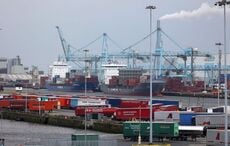Irish billionaire businessman Denis O'Brien and Norman Houston, Director of The Northern Ireland Bureau, were the guests of honor at the 2019 Ireland-US Council dinner in New York.
The Ireland-US Council bestowed the 2019 Award for Outstanding Achievement to Denis O'Brien, Chairman and Founders of Digicel on Wednesday night at the Metropolitan Club in Manhattan. Also honored with the 2019 Cúchulainn Award was Norman Houston, Director of The Northern Ireland Bureau.
Denis O’Brien was presented with the Ireland-U.S. Council Award for Outstanding Achievement in 2019 to mark his distinguished and successful business career and to underline his notable and important achievements in building bonds between America and Ireland.
Speaking at the awards dinner O'Brien spoke about the future of Ireland's tax laws and reality for Ireland preparing for the next phase of foreign investments.
Ireland's tax laws
"Ireland has recovered from an absolutely brutal recession. Everything has now turned around. Unemployment is at an all-time low and the government has a balanced budget and is rolling over its sovereign debt borrowings at less than 1%. But our recovery was not without its pain. We were forced to swallow industrial levels of cod liver oil," O'Brien said.
"Apart from Brexit, the major economic issues facing Ireland relate to corporate tax levels. It is my belief that the OECD will force us to modify tax laws and remove price transfer taxation benefits.
"I do not think we should swim against this OECD tide. That said, I think it will result in a fairer and a more balanced world and certainly poorer countries in the developing world will benefit because taxes on profits will be paid where they are generated."
O'Brien also received the Ireland-U.S. Council Award to celebrate his significant and generous philanthropy over many years to causes aimed at improving the lives of poor people and those less fortunate especially in the fields of education and healthcare.
For example, in Haiti, the Digicel Foundation has invested over $60 million in building 178 schools with over 60,000 students in attendance. Other major philanthropic projects are ongoing in Jamaica, Papua New Guinea and Ireland.
"In Digicel, we pay our taxes in each country in which we operate. I see first hand how a country like Haiti where the Government so badly needs tax revenues to fund its budget," O'Brien told the awards guests.
"With just over 11m people, the Haitian Government has an annual budget for health and all government departments of just over $2.3 billion. That is why NGO’s such as Concern Worldwide are so involved in Haiti today and do such terrific work there.
"The same applies to so many countries in Africa. The world cannot sit idly by and allow companies like Facebook to hoover up billions of dollars in revenues in some of the poorest companies in the world and pay no taxes on its revenues or profits.
"Throughout the world, education has always been the key to unlocking countries from poverty, to putting them on a path to progress social and economic development. In Ireland, we know this all too well, in the aftermath of The Famine in the 19th century."
"Double down" on education
O'Brien pointed out that Ireland needed to adapt to economic development and invest in education, which Ireland's government is failing to do in a dynamic way.
He told the crowd: "In Ireland, we must urgently double down on our funding of and investment into our universities and all third-level institutions. The student/staff ratio needs to be halved.
"Our universities and other 3rd level institutions are doing their very best but with flat or less funding annually from government.
"There have been three economic periods in Ireland in relation to Foreign Direct Investment."
The businessman went on to examine the history of foreign investment from abroad and how it has shaped the economy and society and what the next phase of investment and focus should be for Ireland.
"The first in the 1960s, the newly established IDA attracted foreign companies and mainly low skill jobs were created.
"The second phase was in the 80s and 90s when the vision of Dermot Desmond saw the creation of the International Financial Services Centre. That period also saw some of the world’s largest pharma companies coming to Ireland and high growth tech companies including as Intel, Apple, and Microsoft.
"We are now in the third phase where foreign investment has been led primarily by companies such as Google, LinkedIn, Facebook and others," O'Brien explained.
"The fourth phase is coming rapidly at us and Ireland needs to be ready. We need to be adaptable and have a reservoir of young talented well-educated men and women to fill the job vacancies that will be created in the artificial intelligence, biotech, human genomics, precision medicine, drug research, quantum computing, science and data sectors.
"Climate change will force Ireland to become more responsible about energy forms and there is a need to accelerate our efforts regarding climate change and sustainability. There will also be challenges and opportunities in the food sector as global trends in diet put greater pressure on beef and dairy products.
"The world is changing more rapidly than ever before. Everything is happening at break-neck speed. Ireland needs to ready and adaptable to capture the opportunities and maintain its position as one of the most dynamic countries in the world.
The Ireland-US Council annual dinner was attended by the Irish and Irish American leaders in the community including Alison Metcalfe, Head of Tourism Ireland in North America, Bill Byrne, Head of Aer Lingus in North America, Elizabeth Crabill, Chief Executive Officer at CIE Tours International, Michael Brewster, Financial Advisor with Wells Fargo, and Brian Stack President Ireland-U.S. Council.
Read more: Vulture funds and a coming "tsunami" of Irish evictions




Comments